Each year, the North Oxford Deanery organises a Eucharistic Procession to mark the Feast of Corpus Christi. The Blessed Sacrament is carried from the Oxford Oratory to the Oxford University Catholic Chaplaincy, pausing at Blackfriars Priory where a sermon is preached.
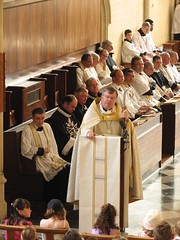 This year, Bishop William Kenney CP, auxiliary bishop of Birmingham, led the procession and preached the sermon at Blackfriars. The bishop encouraged us in our act of witness to the city of Oxford and echoed Pope Benedict's recent document Sacramentum Caritatis exhorting us to live a Eucharistic life, marked by a concern for the needs of the world:
This year, Bishop William Kenney CP, auxiliary bishop of Birmingham, led the procession and preached the sermon at Blackfriars. The bishop encouraged us in our act of witness to the city of Oxford and echoed Pope Benedict's recent document Sacramentum Caritatis exhorting us to live a Eucharistic life, marked by a concern for the needs of the world: "The first and fundamental mission that we receive from the sacred mysteries we celebrate is that of bearing witness by our lives. The wonder we experience at the gift God has made to us in Christ gives new impulse to our lives and commits us to becoming witnesses of his love."
Below are more photographs from the celebration, with verses from the Sequence hymn 'Lauda Sion' by St Thomas Aquinas, which was sung by a schola of Dominican friars as the Blessed Sacrament was carried into the church:
"On this altar of the King this new paschal offering brings an end to ancient rite."
"Shadows flee that truth may stay, oldness to the new gives way, and the night's darkness to the light."
"Flesh from bread, and blood from wine, yet is Christ in either sign, all entire confessed to be."
"Hail! Bread of the angels, broken, for us pilgrims food, and token of the promise by Christ spoken, children's meat, to dogs denied!"
"'The bread I will give is my flesh, for the life of the world' (John 6:51). In these words the Lord reveals the true meaning of the gift of his life for all people. These words also reveal his deep compassion for every man and woman... In the Eucharist Jesus also makes us witnesses of God's compassion towards all our brothers and sisters... Keeping in mind the multiplication of the loaves and fishes, we need to realize that Christ continues today to exhort his disciples to become personally engaged: "You yourselves, give them something to eat" (Matthew 14:16). Each of us is truly called, together with Jesus, to be bread broken for the life of the world." - Sacramentum Caritatis, 88.
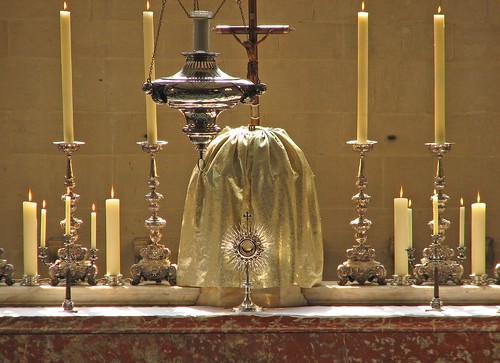
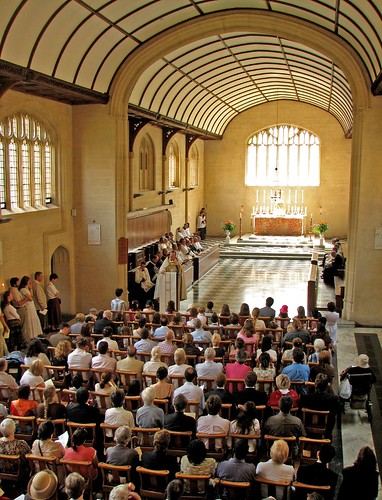
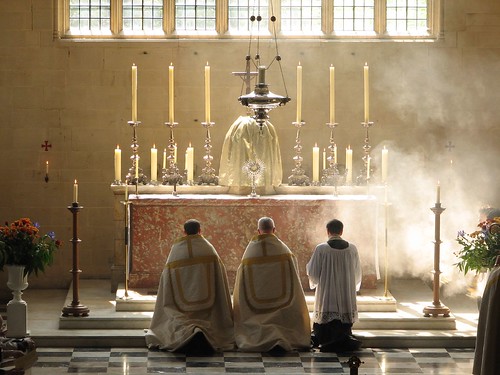
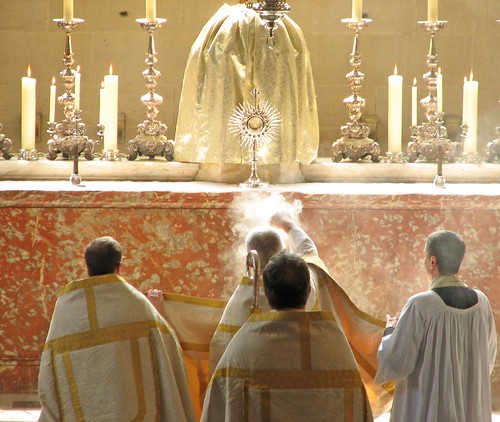
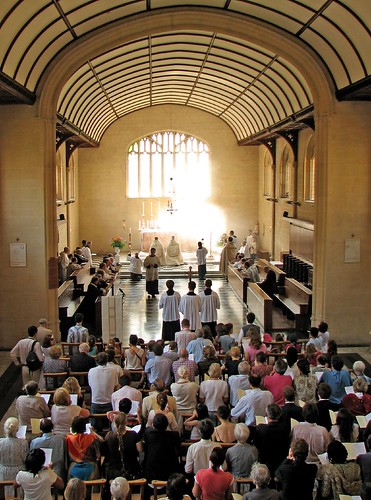

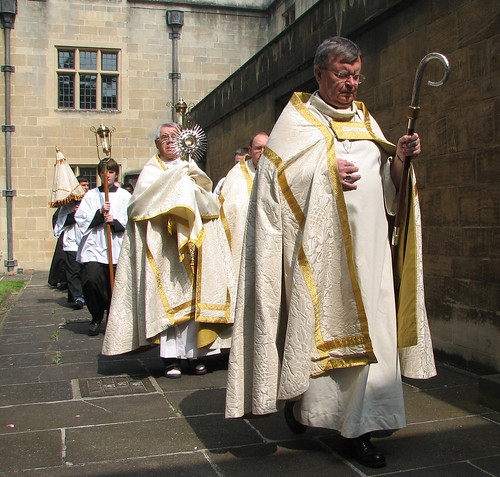
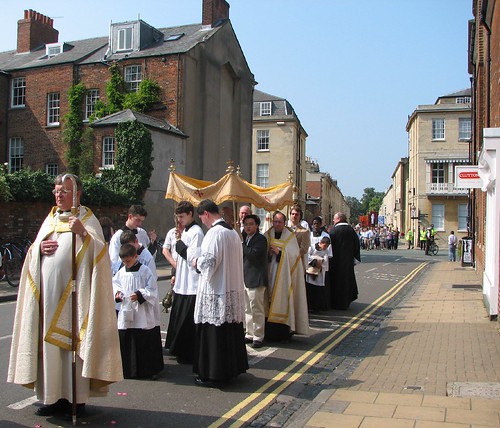
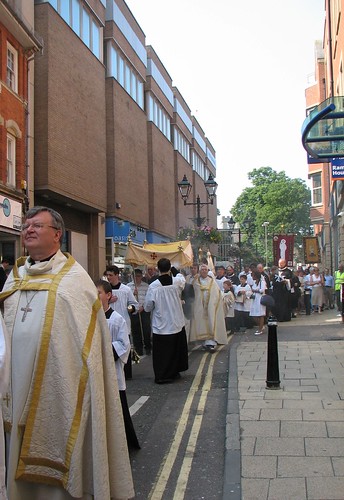
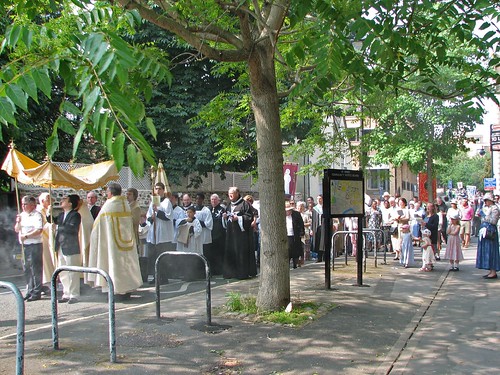
Blackfriars looks beautiful. As usual I wish I could be there and feel far away. However, your comments and website always makes me feel happier. You know, I don't think there was a Corpus Christi procession here at all, which is a shame. Seeing your procession reminds me of how things could be if we all made the effort.
ReplyDeleteWonderful pictures - Thanks! Tom G.
ReplyDeleteI know you guys will find making a comment about abortion and human rights difficult, but the recent media press regarding amnesty international and cardinal martino has brought great concern to many devout catholics who support amnesty in their work to support human rights.
ReplyDeleteIt would be very good to see a reflective consideration of the arguments surrounding the rights of women and the right to life in your blog. I realise that this is a very controversial topic, but for many catholics like myself, who recieved today in their inbox a message from Zenit and Amnesty both arguing their prospective cases, it would be very helpful.
well, I might begin by citing a card-carrying agnostic (Anthony Kenny, What I Believe, Continuum 2006) to the effect that "through most of the history of Western Europe, however, the majority opinion has been that individual human life begins at some time after conception and before birth [and, in earlier centuries] there was no such thing as the Christian concensus [nevertheless, from modern biology, individual stability after the possibility of twinning, ie implantation in his view] the balance of the arguments leads us to place the individuation of the human being somewhere around the fourteenth day of pregnancy....[and this reasoning is two sided, because even if one thinks that before the fourteenth day an embryo might not be considered an individual human being] it gives equally good reason to believe that after that time it is an individual human being . If so, then late abortion is indeed homicide - and abortion becomes 'late' at an earlier date than was ever dreamt of by Aquinas".
ReplyDeleteThus Kenny. Even if some Catholics are unclear about whether an individual human being is present from conception (depending on one's theory of ensoulment) in prudence they should regard all abortifacient actions as deserving of condemnation; certainly all so-called 'therapeutic abortions' that normally take place well after the 14-day limit.
And so to the cardinal's comment. If, using the reasoning discussed above, abortion is equivalent to murder (and it seems difficult to see how it is not); then the only possible justification of the 'Amnesty' position would be under the principle of double effect (which Kenny, and I would take to be valid): that the loss of the foetus as a probable but unintended by-product of saving the mother by some necessary procedure would not incur moral condemnation. Of course, such circumstances would be rare.
Otherwise, the cardinal is surely correct that the church (and catholics) cannot condone the murder of the innocent. The challenge for us is to attend to the needs of both the mothers and the children found in such invidious circumstances. If Amnesty pursues this policy, then perhaps its catholic donors should lobby for their funds to be hypothecated so that these are used for the alleviation of suffering, rather than adding to it.
Thank you for your comment. I do not know the solution but I would add that there is further problem for the Amnesty position as far as the right to life of the unborn child is concerned.
ReplyDeleteAmnesty has now declared certain 'reproductive rights' among the list of rights it recognises - including the right to abortion in certain circumstances. The difficulty is that it is on the basis of the rights it recognises that Amnesty lobbies governmental institutions. So presumably Amnesty will now be lobbying for the right to abortion against those who deny it.
Amnesty has a voice as a pressure group because of its worldwide membership. Money is donated by people who then become members and so implicitly sign up to all its lobbying campaigns. In this respect, being a member of Amnesty seems to be an all or nothing thing - they great sadness then is that people who think abortion is the murder of a child can't in conscience sign up to an organisation which is fighting for it (partly in their name), even when they recognise and appluad the other good work AI is doing.
Hmm, Yes. This is certainly a very tricky issue, and I am not sure that this is the forum for the debate. Howvever, I think that you thoughts about the need to consider abortion as the murder are extremely important, and central to the Catholic understanding of the sanctity of life. There is distinctly a clash of interests here, but perhaps it does not amount to a clash of duties. Catholic supporters of amnesty (such as myself) need to consider strongly arguing that their be a clear division of funds, or that amnesty releases a statement which reflects their consideration of abortion under the principle of double effect as outlined above (although such cases are rare, in situations of domestice violence and rape the health, and indeed life, of the mother are always central to their care.)
ReplyDeleteWith thanks for you comments. This issue continues in my thoughts and prayers.
I think both Gregory Murphy and the most recent comment do not understand how Amnesty works. Amnesty has a series of defined rights which it lobbies for. The right to abortion in certain circumstances in now one of those rights. The circumstances are not the case of double effect (which is a badly misleading red herring in this context). Amnesty has already issued a further statement in reply to the Cardinal.
ReplyDeleteMembers of Amnesty implicitly sign up for their list of defined rights. I think people who have supported Amnesty - I am one - have a duty to be clearly informed about this. The information is available on their website. Amnesty consulted its members on this topic some months ago. I think that members of Amnesty who think abortion is wrong, but who did not say so at the consultative stage, now have a duty to protest to Amnesty. I will give my money to another charity.
Having consulted Amnesty in detail about this issue I am now convinced that that above commentator is correct.
ReplyDeleteI have struggled with this issue and for this reason contacted you on 15.06.07 to help to clear my thoughts.
I love many causes of Amnesty and my heart yearns for the justice in their message. But, now my soul must also mourn for the unborn child whose life is campiagned against. This is a very sad predicament, and one which we cannot solve quickly. It calls for prayer and open discernment on the part of the catholic faithful and Amnesty. I have now become convinced that a temporary cessation of my funds to Amnesty is necesarry, although obviously I will return to supporting their causes as soon as is possible in good conscience.
Amnesty have achieved great good. This cannot be forgotten. It is better to light a candle than curse the darkness, so they say.